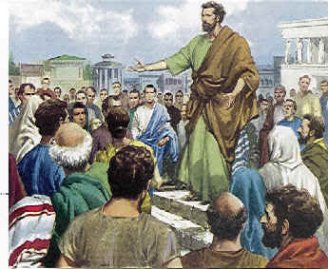It pains me to say this, but there are so many fake ‘ministries’ around. People who claim to be able to heal others, and charge a fortune to let people – usually those desperate for healing – into their meetings. People who whip up their congregations in order to get them to give ‘in faith’ so that they will supposedly get a large return on their ‘investment’. It makes me sick, to be honest. If these big evangelists, healers or whatever are such people of faith, then I am absolutely sure they would know that God is not short of a fiver or two. I am a man of faith and I can testify that God has never once seen me go short. But anyway, I’m not going to name any names nor am I going to judge others. What they are, they are before God, and He knows their hearts. (If they have one) Oops, sorry, I hate it when my keyboard does that… 😉
The effect of all this on the reputation of the Kingdom of God, of course, is pretty poor. Everyone except the people in those congregations ‘following’ that particular ‘ministry’ know full well, or at least strongly suspect, that the whole thing is a charade. Some of these preachers are in it for the money, some for the power, some for the fame, some for any combination of the above. And they all remind me of ‘Simon the Sorcerer’ in Acts who thought the power of God can be bought (Acts 8:18-19).
And I’m not alone in my opinion.
Lately, I read a superb piece by Allison Lynch, on Unfundamentalist, that showcases some of the frustration – not only with charlatan ‘healers’, but also with all kinds of stuff like the ‘gold dust phenomenon’ and stuff. Here is the piece; I don’t necessarily agree with the whole thing, but it needs to be stated for the context:
“I’m sensing that someone in this room has been dealing with a nagging pain in the lower half of their body.”
It’s the end of the church service and the healing and prayer session has begun. I’m sitting in a seat, maybe three or four rows back, and my ears perk up. I’ve been dealing with a stress fracture in my left foot for about six months now, which has prohibited me from running and enjoying physical activity in general. It’s been terrible. I have to wear an aircast on my left leg and hobble around all day with a lopsided gait.
I’ve seen doctors, physical therapists, and sports scientists. They’ve all told me the same thing—I just need to give it time and I need to gain weight to be in a healthy BMI zone, so I can prevent this from happening again. I can cross-train on the bike or in the pool. I should focus on my nutrition and get plenty of rest. Standard recovery stuff.
But the prayer team member up front is giving me some hope. It’s like he’s speaking directly to my soul. My heart starts beating because maybe God will finally answer my prayers. He will use this church person as a vessel to transmit His healing power.
I excitedly and cautiously approach the front of the church where the prayer team is hovering over people and whispering things in their ears. Everyone is either crying, lying on the floor, or laying hands on one another. The worship band is playing soft piano and singing breathy vocals in the background. I find an empty section and wait for someone to pray for me.
If you’ve ever been to an Evangelical Christian church service, this textbook scene probably sounds familiar. In more charismatic circles, you’ll see a lot of shaking and trembling, spontaneous shouts and moaning, and gibberish utterances, a.k.a. “speaking in tongues.” And to think I used to invite my friends to these things as I tried to “share the Gospel.” So embarrassing.
Although I received prayer that Sunday morning, my foot did not heal. Not immediately, at least. In time, I was able to increase my physical activity and return to running. Was it God? No, I don’t think so. It was my choice to listen to my doctors and be patient as my body healed.
Still, I left church that day feeling like God was punishing me for some sin I had committed, and this injury happened in order to “test” me. After all, the God I grew up with in the Evangelical world was punitive, angry, and hated Eminem songs. He allowed natural disasters like Hurricane Harvey and the California mudslides to happen because humans were not obeying him. So naturally, he let this happen to me probably because of that time I got drunk with my friends our sophomore year of high school.
For years I lived with this mindset. I was terrified of disobeying the imaginary rules God set forth, enforced by ideologies contrived by wealthy white businessmen like Franklin Graham, Pat Robertson, Dr. Dobson, and Dennis Rainey. These men and their beliefs controlled my life—no boyfriends, no sex, no Harry Potter, no birth control, no secular music, no trick-or-treating, no PG-13 movies. I was a prisoner in my own life.
On top of these constant restrictions, supernatural ministry was very prominent in my church. We had courses and workshops that taught us how to invite the holy spirit, and we’d practice on each other in Sunday school. None of us had a clue what we were doing, but mimicking the adults and their strange behaviors was easy enough.
In church, they’d always tell us crazy stories about limbs growing back on people or tumors disappearing in MRI scans. Despite there being no video record of this online or reporting from reputable sources, these stories were well-received and told over and over again by the Evangelical community. Trying to prove these miracles was like chasing Bigfoot.
Then there was the gold dust. In rooms and church pulpits overwhelmed with the presence of the holy spirit, gold dust can supposedly fall from the ceiling, or appear on people’s hands. Again, I had never seen this personally, but you bet I tried and hoped it would happen to me.
These beliefs are perpetuated in charismatic circles and non-accredited ministry “schools” like the Bethel School of Supernatural Ministry, which is the equivalent of a Christian Hogwarts. Please Google it when you have a chance. I’m afraid I can’t cover all the absurdities in one blog post, but I’ll try to give you an overview.
Bethel is scam in the sense that it costs a lot of money to learn how to do supernatural, unproven things, but it operates like a legitimate education system. You pay money to attend a school where instead of learning applicable job skills and getting a real degree, you hang out with other Evangelical Christians and attend courses that essentially teach you how to be a prophet and a miracle worker. You also solicit your friends and family on Facebook to “please help me raise money for my trip to Australia where I’m going to sit on the beach all day and spread the Gospel.”
These “schools” do not help young adults advance their skills in the real world, but instead further advance the Evangelical agenda. Additionally, in my opinion, they bring out a sense of narcissism and self-righteousness in young individuals who believe they have the power to heal people and speak to God better than others. It fits in perfectly with the Evangelical need for power, control, and an absolute sense of morality. If you witness miracles and get “words” from the Lord, then you must be in a position of authority above others.
Here’s a prime example:
The other day, an acquaintance of mine from my former church days posted a Facebook live video of herself and a young group of people from The Gospel House (an Evangelical intentional living community out in California) giving “words” to random people in a strip mall parking lot.
A young man took hold of the phone they were passing around and started speaking to the camera. The scene was pretty boilerplate charismatic Christian: first he would whisper in tongues, then he would get quiet, then he would say “I’m getting a word…I feel like God is telling me….”
It reminded me of those cheesy Saturday morning psychic shows you watch while eating a late breakfast. During the live video, the ministry team took turns speaking to the iPhone and sharing their words, which were vague descriptions of common challenges: there is someone struggling with finances, someone who has a deep relational wound, someone who needs to know God loves them right now, etc. Easy stuff you could tell literally anyone and it would apply.
What’s even more sad is how people were engaging in the comment section. Desperate people who believed these words were for them. Who were making prayer requests on the fly. As if a group of young people standing outside of a Walmart taking selfies and sharing it on social media held the key to their futures.
I truly pity people who are still stuck in this world. Maybe it sounds arrogant, but it’s only because I know that could have been me. After graduating from a small Christian college, I considered studying at the International House of Prayer (IHOP) as I tried to figure out what “God wanted me to do.” At IHOP, you basically sit around and pray all day, you have a curfew, and you read the Bible a lot. Thankfully, I chose a marketing internship in Boston that paid $10.50/hour, which planted the seeds for my actual career.
I understand that we all want purpose and belonging. And I get that some people find it by going to places like Bethel. It’s an immediate sense of community with people who think exactly like you, and who praise you for following the biblical rules they set forth. This is basic anthropology. Unfortunately, it can be dangerous and toxic, and it can give people power to claim authority over another person’s spiritual journey who have no right to do so.
In a presidential cycle where the administration is receiving support and validation from the likes of Franklin Graham and Jerry Falwell, I can’t help but feel like this is a macro-version of what I experienced ten years ago during that healing service. False promises, false authority, and subjective conclusions. I guess the major difference is that the people who prayed for me then actually cared about my well-being.
As for my belief in the supernatural, I still hold on to some things. I still pray. I still believe there are things we can’t see or ever know. The universe is too big and I am too small. I do not like thinking that something can only be true if I can see it and feel it. We live in a world of layers, and our volumeless thoughts are arguably more powerful than any physical presence.
But hey, at the end of the day I’m still going to need a Youtube video or a Snapchat of your leg growing back for me to believe it. I mean, that’s just something cool I’d love to see.*
I must say straight away that one of my best friends is a trainer at a Bethel School of Supernatural Ministry here in the UK. I’ll leave it at that, except to say that it’s definitely not all bad 🙂
I didn’t agree with everything in that post, like I said, but I felt that I needed to post a further opinion in order to accentuate the positive. Not that Allison was in any way excluding real miracles – she expresses the desire to see them for herself! – but I wanted to put in a definite word for the ‘Real Thing’.
Here it is:
Well, I fully understand – and mainly agree with – the arguments expressed in the OP [original post – Ed]. And as usual, you present your arguments clearly and gently. I love your writing.
No doubt you were expecting this kind of reply, but please don’t throw the baby out with the bathwater. Don’t let the charlatans’ fools’ gold spoil the real gold.
I personally have had real words of knowledge, very specific, for example for one particular person in a small group meeting, which resulted in her being healed of a kidney complaint. And no, I can’t document it, because we didn’t even think about trying to prove it to anyone; we weren’t bothered about proving it. And I am not claiming that words of knowledge are specifically for healing; often they are just something you know about someone or about a situation because God tells you. There are intimacies and depths with the believer’s Relationship with God that some of us have not yet plumbed; don’t let the charlatans take that away from you. The secret of the Lord is with those who fear Him, and that has been real in my experience. He tells me all kinds of things that I cannot share, but that doesn’t make them any less real.
And I personally have been healed of something too. I can’t go into details, but it happened at home, with just my wife and I present, it was totally unexpected but it happened. I have a photo of the ‘after’ the healing, but no photo of the ‘before’. So again I can’t prove it. And I’m not trying to prove it; I’m not interested in doing so because I am not trying to convince anyone. Most of the time these genuine healings occur unnoticed and undocumented, partly because they are so unexpected. Nobody ever thinks, ‘Hey, I’m going to be healed tonight, let’s take a photo of my warts before we go, and then take a picture of the clear skin afterwards’. And nobody ever gets words of knowledge about haemorrhoids…
The idea of healing is not for evidence or proof, it is for the benefit of those being healed and those around them. Counterfeit ‘ministries’ do not negate the very real things that go on in the lives of unsung people who avoid the limelight. God is up to far more than you can imagine, behind the scenes, in homes, in real lives. Don’t discount it.
God is supernatural. Don’t be surprised that He can still do supernatural things.
Oh and P.S. Like some [of the other forum replies], I too don’t like anything that has ‘ministries’ in the title. Equally, I will never, ever accept as a Facebook friend anyone whose name is ‘Evangelist’ Joseph BongoBongo, ‘Pastor’ what’s-his-face, ‘Prophet’ blah-de-blah or any other such twaddle. Believe me, my cynicism is just as real as anyone else’s, but I do recognise when there are real healings going on.
I think I don’t need to say a lot more, except to reiterate that God is the same today as He’s always been – ready to heal, ready to create, ready to be close to those who need Him. There is far more to God and to the Christian life than just healing. And the Kingdom of God is immeasurably more than these scams portray it to be.
So, let’s not throw out the baby with the bath water. There is a real God, Who does real miracles; it’s just that we don’t sees them all that often. Most of the time, in fact, the miracles are going on ‘behind the scenes’: people being quietly set free from addiction; people like me who receive inner healing from Jesus on a daily basis; people realising there is so much more to life than they formerly knew. This blog is shot through with examples of such things, but, like in life, you have to dig to find them.
Grace and Peace to you.













 would not sit still for: He told him there is no Hell. And Carlton openly declared this visitation to his congregation. He paid the price for that honesty, in that he lost many of his congregation and was also declared a heretic by his peers. He felt he could not ignore the voice of God he believed he had heard, despite the reception his declarations received and despite the rejection he suffered. The movie is on Netflix,
would not sit still for: He told him there is no Hell. And Carlton openly declared this visitation to his congregation. He paid the price for that honesty, in that he lost many of his congregation and was also declared a heretic by his peers. He felt he could not ignore the voice of God he believed he had heard, despite the reception his declarations received and despite the rejection he suffered. The movie is on Netflix,  Turner, whose work I share regularly here on Flying in the Spirit. Apparently – although personally I have never been subjected to this – some churches actually get their members to sign a declaration that they believe in the doctrines of the church; these may be specific ideas or they may be general ones applicable to the denomination as a whole. In any case, these doctrines will eventually become strictures, or possibly stumbling-blocks, to the more honest people in these congregations who may have genuine questions or doubts – in terms of the
Turner, whose work I share regularly here on Flying in the Spirit. Apparently – although personally I have never been subjected to this – some churches actually get their members to sign a declaration that they believe in the doctrines of the church; these may be specific ideas or they may be general ones applicable to the denomination as a whole. In any case, these doctrines will eventually become strictures, or possibly stumbling-blocks, to the more honest people in these congregations who may have genuine questions or doubts – in terms of the 